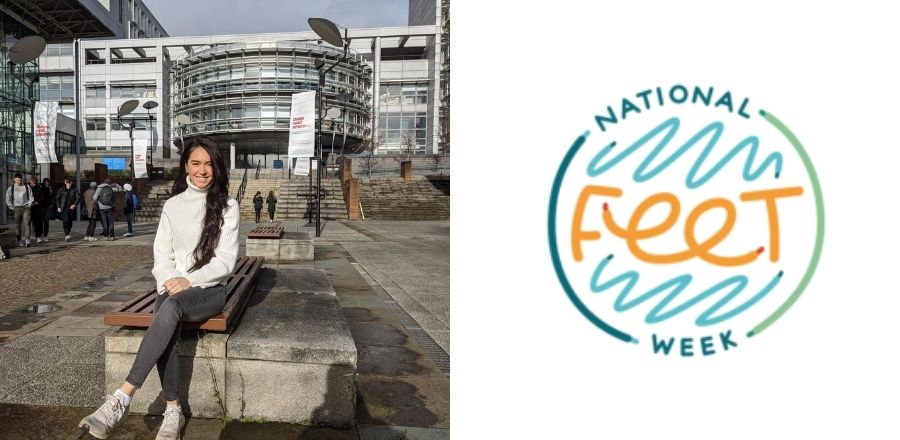Always used but often neglected – the importance of our feet

A GCU student has given an insight into the world of podiatry as part of National Feet Week.
Taking place between the 7th and 13th of March, National Feet Week encourages everyone to take responsibility for their foot health and address any unexplained issues they’re experiencing.
Corran Kennedy, who’s in her final year of the BSc (Hons) Podiatry programme, is keen to remove the societal stigma around feet, while also making people aware of her profession and the support it can provide:
Why did you decide to study podiatry?
Initially I was looking to study physiotherapy and I had work experience with a physio who did quite a lot of podiatry work. I was quite surprised by how much I learned from it and how podiatry isn’t just about your feet. I then just started to look into it more and I realised that it was something I wanted to specialise in.
Why are our feet so important?
Everyone seems to forget that you can’t go a day without using your feet. You use them everywhere you go and when something goes wrong with your feet, you’ll know all about it. I think people forget and do neglect them, probably without realising the impact that can have.
A lot of people also aren’t aware of the other health conditions that can then have a big effect on your feet. If you take high blood pressure for example, it can have a really negative effect on you with lack of blood flow to your feet – it’s probably the first place you’ll start noticing changes.
During my time at GCU, I’ve spent time at Musculoskeletal Clinics and I once had someone ask about why I was focusing on their knees and hips . The human body is basically a big chain and if something is happening in one area then it will probably have that domino effect, ending at your feet.”
We go to doctors, dentists, opticians for any issues - you don’t hear about podiatrists getting used as much; why do you think that is?
“There’s definitely a lack of understanding around the role overall. I’ve had quite a few people say to me; “oh, you work with kids” because they’ve got podiatry mixed up with paediatrics…
I think a lot of people think we just clip toenails and deal with calluses, but we deal with much more serious health conditions. I think there is a lack of advertisement overall about the role of a podiatrist, it’s definitely something that should be promoted more. If people understood what it was all about then more people would become interested in it.”
Do you think there’s also an element that we’re a bit embarrassed to show off our feet?
“A lot of folk have asked me why I want to study a subject that focuses on feet; there is definitely a bit of a stigma where people think it’s disgusting. However, again with the lack of understanding, people don’t realise the support we can offer and often go to their GP if they have an issue with something like an ingrown toenail, when a podiatrist could easily help with that.”
In the simplest terms, what is the role of a podiatrist?
“The easiest way to put it is that we’re basically specialists of the lower limbs. Podiatrists have a really good understanding of joint pain, wounds, and basically everything from the hip down. We also provide support for musculoskeletal conditions, such as tendinitis and systemic conditions, such as rheumatoid arthritis.”
Has the pandemic had an impact on our feet?
“The way we were seeing patients during covid was quite a drastic change from the norm. The focus has been on high-risk patients with systemic condition or ulcerations and infections. It’s only recently that people with issues like corns and calluses have been treated. They aren’t as severe as ulcerations but can really hinder someone’s life – they look small but the amount of pain is really severe.
It’s a challenging time for podiatrists now because a lot of people want to be seen and are getting quite frustrated. There have been people waiting seven months when they usually get an appointment every six weeks."
What would your advice be to any students that are having issues?
“If you have any concerns then please don’t be scared to reach out – no worry is too little! I’d encourage everyone to look at the NHS website to see if anything matches up in terms of what they’re experiencing. If you still have questions that have been unanswered then definitely book an appointment with a podiatrist to see what’s going on.”
By Ross Clark
Got an SHLS or GSBS story? Email me at Ross.Clark@gcu.ac.uk or message me on Twitter
